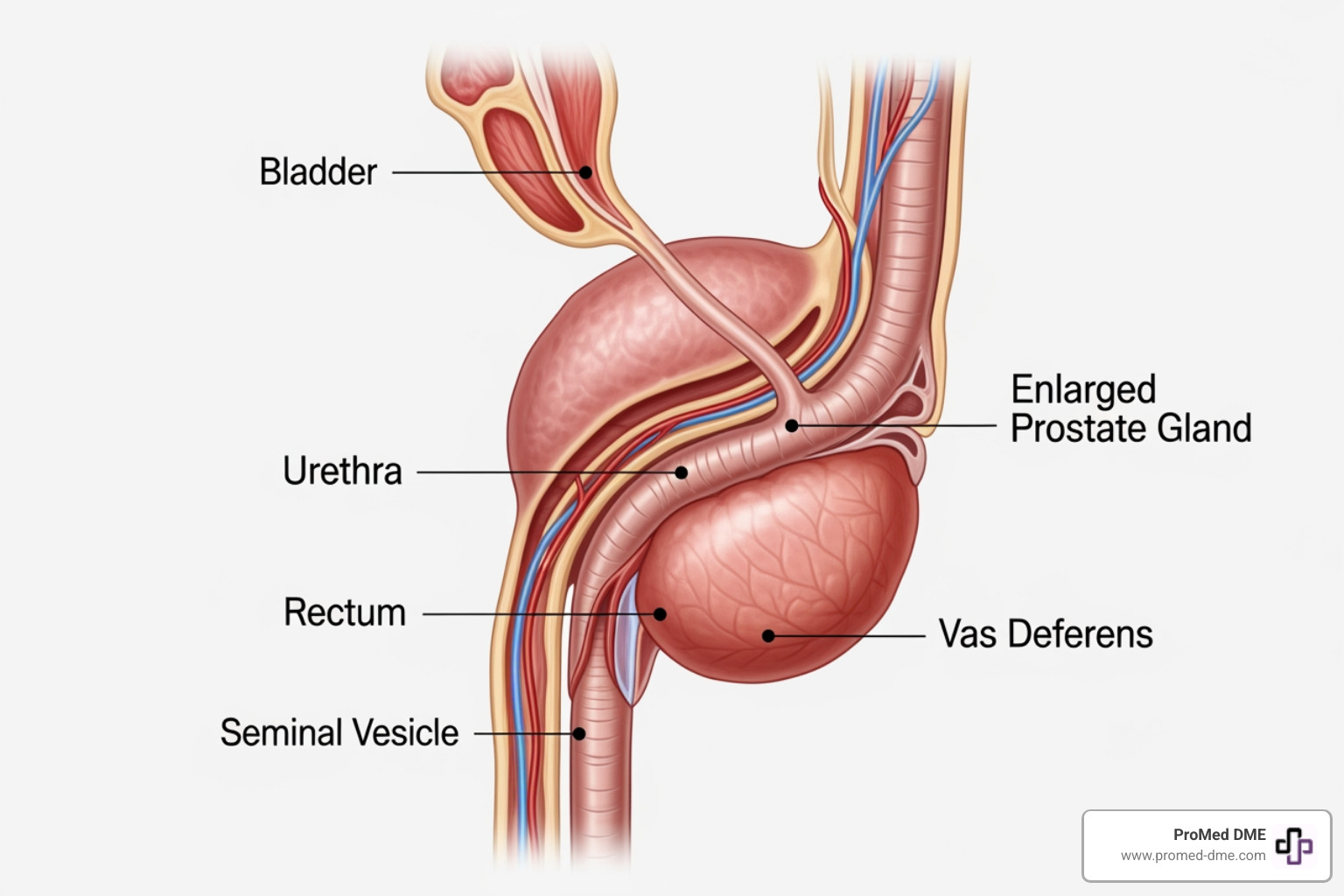Health Care Supplies: A Buyer's Guide

Introduction
When searching for health care supplies, it's crucial to understand that these products encompass a wide range, from durable medical equipment (DME) to daily disposables like gloves and syringes. These supplies are essential for managing health conditions and ensuring the well-being of patients, particularly for those with chronic conditions such as diabetes or urinary issues.
For retirement-aged individuals, especially those managing chronic health conditions, finding cost-effective and reliable medical supplies is about more than convenience—it's about maintaining quality of life. At ProMed DME, we focus on providing not just health care supplies but also extensive support in navigating prescriptions and insurance coverage, ensuring that you find what you need without unnecessary hassle.
Identifying the right supplies involves understanding the various categories:- Durable Medical Equipment (DME): Items like wheelchairs or home oxygen equipment that are used repeatedly.- Diagnostic Equipment: Tools such as blood pressure monitors and glucose meters.- Personal Protective Equipment (PPE): Including masks and gloves to ensure safety from infections.- Medical Instruments: Such as stethoscopes and thermometers, vital for daily health management.

By the end of this guide, you'll better understand how to select the right products and suppliers, ensuring your health care needs are met effectively and efficiently. Whether you're a caregiver or someone seeking personal health solutions, knowing these details will empower you to make informed decisions.
Understanding Health Care Supplies
Navigating health care supplies can be daunting. But understanding the basic categories helps in making informed choices. Here we break down four essential types of supplies: Durable Medical Equipment, Diagnostic Equipment, Personal Protective Equipment, and Surgical Instruments.
Durable Medical Equipment (DME)
Durable Medical Equipment is designed for long-term use. Typically prescribed by healthcare providers, DME includes items like wheelchairs, walkers, and hospital beds. These are not only robust but are crucial for patients' daily living, often aiding mobility and improving quality of life.
Key Fact: DME is meant to withstand repeated use, making it a vital component in managing chronic conditions or recovery from serious injuries.
Diagnostic Equipment
This category includes tools that help in assessing a patient’s health status. Common examples are blood pressure cuffs, stethoscopes, and glucose meters. These tools are essential for early detection of potential health issues and for monitoring ongoing conditions.
Example: A blood pressure cuff can help detect hypertension early, allowing for timely intervention and management.
Personal Protective Equipment (PPE)
Personal Protective Equipment is critical in safeguarding health workers and patients by preventing infection spread. Items include gloves, masks, gowns, and face shields. The importance of PPE was highlighted globally during the COVID-19 pandemic, showcasing its role in protecting against virus transmission.
Statistic: According to the Centers for Disease Control and Prevention, proper use of PPE significantly reduces the risk of viral transmission in healthcare settings.
Surgical Instruments
These are tools used during surgery to perform specific actions like cutting, dissecting, grasping, holding, retracting, or suturing. Surgical instruments include scalpels, forceps, and scissors, which are designed for precision and safety.
Case Study: In a recent surgical procedure, the use of high-quality forceps allowed for a more precise operation, reducing tissue damage and improving patient recovery times.
Understanding these categories and their applications helps in making informed purchasing decisions, ensuring that you are equipped with the right tools to handle health challenges effectively. Knowing how to choose the right supplier and manage costs through insurance will further streamline your experience with health care supplies.
Choosing the Right Supplier
When it comes to acquiring health care supplies, selecting the right supplier is as crucial as the products themselves. Here, we'll explore key aspects such as Reputation, Experience, Customer Feedback, and Insurance Collaboration to ensure you partner with a supplier that meets your needs effectively.
Reputation
The reputation of a supplier in the medical field is telling. A well-regarded supplier is often associated with reliability and quality. Look for companies that are recognized for their contributions to health care, similar to how Henry Schein Medical is known for its superior medical supplies and integrated solutions. Such companies often lead with innovation and are seen as thought leaders in the industry.
Experience
Experience speaks volumes. Suppliers with a long-standing presence in the market usually have a proven track record. They have not only witnessed the evolution of medical needs over the years but have adapted to meet these changes effectively. For instance, Ochsner Health has been delivering impactful health solutions since 2003, showcasing their experience in the field.
Customer Feedback
Listening to what others have to say about a supplier can guide you towards making a better choice. Positive reviews often indicate satisfactory service and product quality. However, pay attention to how a company responds to negative feedback as well. A reliable supplier will handle criticisms professionally and work towards resolving issues promptly.
Insurance Collaboration
Navigating the complexities of insurance while purchasing medical supplies can be daunting. A supplier that collaborates with insurance companies can ease this process significantly. For example, providers like Ochsner Home Medical Equipment work directly with your insurance company to ensure you get the necessary equipment at a fair price. This cooperation can be a game-changer in making health care supplies both accessible and affordable.
By focusing on these critical factors, you can form a partnership with a supplier that not only enhances your access to essential health care supplies but also supports your overall mission to provide excellent care. As we delve into the specific types of supplies and tools needed for various medical scenarios, keep these supplier qualities in mind to ensure a seamless and effective acquisition process.
Essential Health Care Supplies for Various Needs
When it comes to providing top-notch care, having the right health care supplies is crucial. Each type of supply serves a specific function in diagnosing, treating, and managing patient health. Here, we break down the essentials across different categories: Standard Tools, Diagnostic Tools, Laceration Supplies, and Durable Medical Equipment.
Standard Tools
These are the must-haves in any healthcare setting, crucial for everyday operations.
- Gloves: Essential for infection control, available in latex, nitrile, or vinyl.
- Bandages and Gauze: For dressing wounds and managing minor injuries.
- Medical Tape: Secures bandages and devices without irritating the skin.
- Disinfectants: Critical for sterilizing medical environments and equipment.
These items are used frequently and need regular replenishment, making them fundamental in daily medical care.
Diagnostic Tools
Accurate diagnosis is the first step towards effective treatment. Essential diagnostic tools include:
- Stethoscopes: For assessing respiratory and cardiovascular health.
- Blood Pressure Monitors: Vital for monitoring cardiovascular health.
- Thermometers: Necessary for checking body temperature.
- Otoscope and Ophthalmoscope: For ear and eye examinations.
These tools help in early detection of potential health issues, guiding further medical action.
Laceration Supplies
Managing cuts and wounds effectively prevents infection and promotes healing. Essential laceration supplies include:
- Sutures and Needles: For closing wounds.
- Sterile Drapes: Creates a clean area around the wound.
- Antiseptic Wipes: To clean the wound area and prevent infection.
- Lubricating Jelly: Used to ease the application of various medical instruments during wound care.
Proper laceration management is critical, especially in emergency and surgical settings.
Durable Medical Equipment (DME)
For patients needing long-term care, DME is indispensable. It includes:
- Wheelchairs: Enhances mobility for those with limited movement.
- Hospital Beds: Provides necessary comfort and positioning for bedridden patients.
- Walkers and Canes: Aids in mobility and balance.
- Patient Lifts: Essential for safely moving patients, especially those with severe mobility limitations.
DME is designed to withstand repeated use and is crucial for rehabilitation and improving the quality of life for many patients.
By understanding the specific roles and applications of these varied health care supplies, facilities can ensure they are well-equipped to handle a broad spectrum of medical situations. Knowing how to navigate insurance and Medicare for acquiring these supplies will further empower healthcare providers in their mission.
Navigating Insurance and Medicare for Health Care Supplies
Navigating the complex world of insurance and Medicare for health care supplies can be daunting. Here, we break down the essentials: Coverage, Eligibility, Documentation, and Pre-authorization.
Coverage
Insurance and Medicare coverage for health care supplies varies widely depending on the policy and the type of equipment. Generally, Medicare Part B covers a portion of the cost for medically necessary durable medical equipment (DME) like walkers, wheelchairs, and hospital beds if prescribed by a doctor. Private insurance policies might have different coverage levels, so it's crucial to check with your provider.
Eligibility
To be eligible for coverage under Medicare, the equipment must be:- Medically necessary and prescribed by a Medicare-enrolled physician.- Used in the patient's home.- Likely to last for three years or more.
For private insurance, eligibility can depend on the specific plan's rules. Always verify directly with your insurance provider to understand the eligibility criteria.
Documentation
Proper documentation is key to ensuring that insurance providers cover the necessary DME. This includes:- A detailed prescription from a healthcare provider.- Medical records supporting the need for the equipment.- A Medicare Certificate of Medical Necessity (CMN) for certain types of equipment.
Keep all documents organized and readily available to smooth the process of claims and approvals.
Pre-authorization
Many insurance plans, including Medicare, require pre-authorization for certain types of DME. This means the insurance provider must approve the item before they agree to cover it. The process usually involves:- Submitting a request that includes the prescription, a statement of medical necessity, and any supporting documentation.- A review by the insurance provider to determine if the equipment is covered and medically necessary.
It's important to initiate this process well in advance to avoid delays in receiving the necessary equipment.
By understanding these key areas, healthcare providers can more effectively manage the acquisition of health care supplies, ensuring patients receive the necessary tools without undue delay or financial burden. Next, we will explore some of the most common questions people have about health care supplies and their providers.
Frequently Asked Questions about Health Care Supplies
Navigating health care supplies can be complex. Here are answers to some of the most common questions to help simplify the process.
Who is the largest supplier of medical supplies?
McKesson Corporation is recognized as the largest supplier of medical supplies in the United States. Established in 1833, McKesson plays a critical role in the healthcare supply chain, delivering a significant portion of pharmaceuticals and medical supplies across North America. Their extensive range of products and services makes them a cornerstone in the industry.
What do you look for in medical supplies and suppliers?
When choosing medical supplies and suppliers, consider the following key factors:
- Quality and Safety: The products should meet industry standards and regulations to ensure patient safety.
- Reliability: Suppliers should have a proven track record of delivering products on time and accurately.
- Customer Service: Responsive and helpful customer support is crucial, especially when dealing with medical supplies.
- Product Range: A wide range of products allows for one-stop shopping for all medical needs.
- Insurance and Medicare Collaboration: Suppliers that work closely with insurance and Medicare are preferable as they can help navigate coverage issues.
What is durable medical supplies?
Durable Medical Equipment (DME) refers to equipment and supplies that provide therapeutic benefits to patients in need due to certain medical conditions or illnesses. DME includes items like:
- Wheelchairs
- Hospital beds
- Walkers
- Oxygen tanks
These items are designed to be durable enough for repeated use, typically in a non-hospital setting, aiding in quality of life and mobility.
Understanding these basics can help you make informed decisions when acquiring health care supplies. Whether you're a healthcare provider or a patient, getting the right supplies is crucial for effective care and recovery.
Conclusion
At ProMed DME, our commitment is to ensure that you have access to the best health care supplies for your needs. We understand that navigating medical supplies can be daunting, which is why we strive to provide not only high-quality products but also comprehensive support and information to help you make the best choices for your health and well-being.
Our range of products covers everything from durable medical equipment to advanced diagnostic tools, ensuring that we can serve a wide spectrum of healthcare needs. Whether you are managing a chronic condition, recovering from surgery, or providing care for a loved one at home, ProMed DME is your reliable partner.
Why Choose ProMed DME?
Quality and Reliability: All our products meet rigorous standards for quality and reliability. We partner with leading manufacturers to ensure that you receive the best health care supplies available.
Comprehensive Product Range: Our extensive catalog ensures that you can find exactly what you need, all in one place. From wheelchairs and hospital beds to more specialized supplies like oxygen tanks and diagnostic equipment, we have you covered.
Expert Support: Our team is knowledgeable and ready to assist you in selecting the right products. We understand the challenges that come with different health conditions and are here to provide guidance and support.
Insurance Collaboration: We work closely with insurance providers to help you navigate coverage options and ensure that you can access the supplies you need with minimal financial burden.
At ProMed DME, we are more than just a supplier; we are a partner in your health care journey. We believe that everyone deserves access to high-quality medical supplies that can improve quality of life and aid in recovery.
As you continue to explore your options for health care supplies, our team is here to assist with any questions or needs you might have. Visit our service page at ProMed DME to learn more about our products and how we can help you in your journey toward better health.
Together, let's ensure that you and your loved ones receive the care and support you deserve. Thank you for choosing ProMed DME as your trusted provider of health care supplies.
Related Resources & Articles
Stay informed with our informative blog posts.
Discover the ProMed Advantage
& Try Our Products
We offer free shipping and legendary customer service to ensure you receive the
best DME products for your needs.



